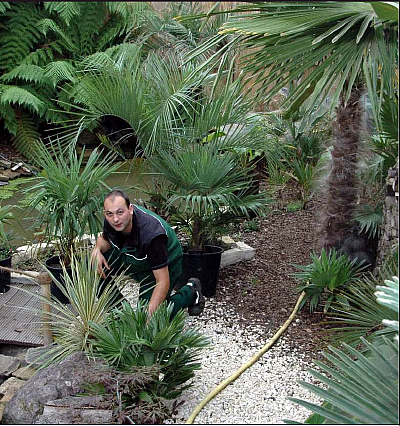- Large and unique assortment
- Quick delivery all over Europe
- Your specialist in exotic plants and trees
 These days gardens embracing the modern Tuscan style are ever more frequent. But many are still sceptical that these southern plants can handle local unstable Summer weather, let alone the vagaries of the Northern European winter.
These days gardens embracing the modern Tuscan style are ever more frequent. But many are still sceptical that these southern plants can handle local unstable Summer weather, let alone the vagaries of the Northern European winter."No problem", responds Hendrik Speet, from Twist in North West Germany. The gardener took over a rose-nursery at the Dutch-German border in 2009 with his Dutch colleague, Herbert Riphagen, and turned it into a nursery for palm trees. Here the firm Gardenpalms Europe Plc was established. Together with six seasonal workers they currently care for around 300000 palm trees under around 20000m2 of greenhouses. Approximately 3600 different species of Palm are cultivated, imported and sold wholesale. "Huge numbers of palms arrive here from auctions and are allowed to acclimatise every year". Only then are they considered fit for resale. "So having a palm in your garden should be a reality, not a dream", says the 28 year-old. "Palms just need the right sort of care"". For example, he does not recommend keeping palms in pots. Roots need to be able to develop deeply so that frost cannot reach them and so that they can develop properly. Of course, many will wish to move their pot around to be near the pool-side or the barbecue, but Hendrik discourages this. "A fixed position is very important".
He also advises his own specially designed palm soil containing few salts. Also, frequent watering is essential. Even the palm trees which we see on Mediterranean islands constantly need water. Considering the costs involved in acquiring and acclimatising palm trees, it would be wise for palm owners to heed this advice! He would advise against cheap deals. "These often come from China and, having good vegetation, grow rapidly. But the winter brings dissapointment!". This the gardener knows from personal experience.
He and his colleague get their palms mainly from South Brazil and South Korea. In a nursery at an altitude of 800m the palms develop hardened trunks, which are tougher than trees from China and so easily survive temperatures below zero. Speet and Riphagen agree that for these palm trees, temperatures up to minus 10 Celcius pose no problem at all. Even so, it"s advisable to prepare for the winter by tying the palm leaves together so that water does not accumulate at the heart of the plant and so encourage mould development. For the same reason, one should not water the top of the plant, rather around the base of the trunk. "Specialists should give this advise to customers at point of sale - if you"re not advise this, find another nursery!" But you can also consult the information printed on the plant label. Here you can usually find the origin of the plant and tips for it"s care. "The trend for continually exaggerated claims for frost tolerance is a problem", says Riphagen. If commercially grown roses have been shown not to survive severe frost, how can palms do so?".
Both gardeners agree that despite the rainy and changeable weather in their surroundings, palms can quite easily be kept outdoors. "Palms are associated with the South, with holidays. Who doesn"t like a bit of holiday feeling in their own garden?". All you need is a bit of knowledge and application.
Every Saturday Speet and Riphagen are open to the public for advice and information in their nursery at Beekweg 18 in Erica, North East Holland, from 10am to 4pm.
© 2011MyPalmShop.com